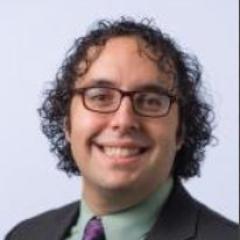
Volunteer of the Month: Cantor David Berger
David Berger is the Cantor at KAM Isaiah Israel, Hyde Park, Chicago, IL. He is a 2007 graduate of HUC-DFSSM.
In what capacity have you volunteered for the ACC, and how did you get involved?
Since I joined the Board in 2010 I have worked on Professional Development with the ACC. I began this role working with Shira Nafshi and then became the chair of our committee. We have done some great work over these few years. I’m now looking for additional cantors committed to the mission of continuing education and professional development to join me in this work. Lately, my greatest undertaking was our recent Israel convention. At the time we started planning, I was living in Israel for the year teaching at HUC, and doing the Melton Senior Educators Fellowship at Hebrew University. The convention was three years of continuous work and I think it was a tremendous success. I’m currently working on the Florida convention for this summer.
What’s the most rewarding aspect of volunteering for the Conference?
I enjoy the company of cantors. I like hearing people talking about shul, and just hanging out. By my being in the ACC and being on the Board, I get to spend time with other cantors.
What do you see as the biggest challenge facing the cantorate now and in the future?
I think that we are at a moment in our profession where none of the assumptions of the old world hold true anymore. Our people are not the same people that this job was designed for. Everything that we established long ago as the baseline is a little bit up for grabs. In order to be working as a cantor now, you have to be ready and able to do a thousand things that frankly, almost none of us have any training for.
Part of the way we define ourselves as cantors comes from the musical tradition we worked so hard to study and master. After years of work and preparation, we find ourselves out in a world with not much room for all of that material. It’s a challenge to our self-definition. What we do as cantors - the daily tasks that define our professional lives appear radically different from our studies. At my previous synagogue I did graphic design, which the congregants tremendously appreciated. I designed bulletins, posters and formatted flyers. It made a difference to my congregation, but it certainly was never talked about at the School of Sacred Music. A lot of cantors are incredibly adaptable people, and bring a wide range of skill sets to the job, but the question for the future of our profession is: how are we going to redefine the core of what we do as a cantor when what we do is so vastly different from each other?
Why did you become a Cantor? What influenced or motivated you to get into this profession?
My cantor growing up at Congregation Beth Am in Buffalo Grove, IL was Cantor Arnold Schultz. He was a wonderful person in my life and a fine musician. I use to spend a lot of time in his office. He would tell me how things were going with the Rabbi, in the synagogue, and some of things he wanted to do. I felt invited into the "real life" of the synagogue. In some ways, he was a little ahead of his time by fulfilling a double role as Cantor and Administrator for the synagogue when he first started. He has always been incredibly supportive of me as long as I can remember. Most directly, however, it was Matti Lazar who pretty much sent me to my HUC interview, and I am truly grateful to him for pushing me in the right direction.
Tell us one thing about yourself that we might not know, but that you’d like to share with us.
Growing up in high school, I was not a singer. I wasn’t in the choir or vocal groups. I didn’t sing in any organized group at all until I was in college. I played low brass instruments all through high school. My main instrument was the Euphonium (or Baritone horn) but I also played Tuba and Bass Guitar.

